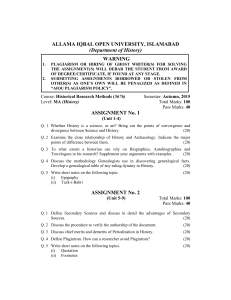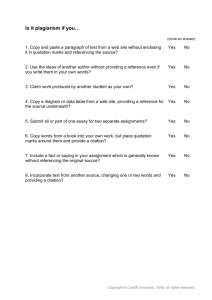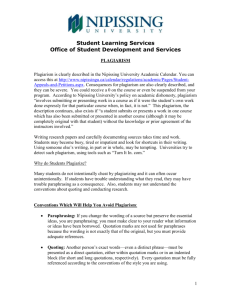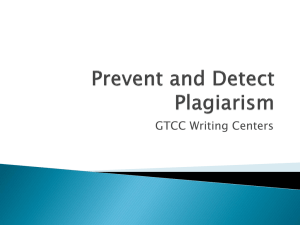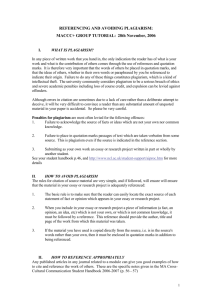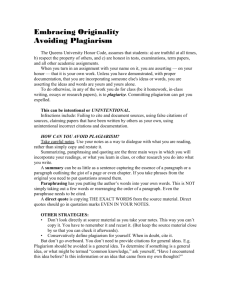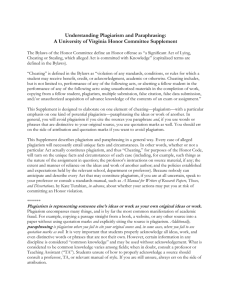How Plagiarism Happens Stephen: The issues surrounding
advertisement
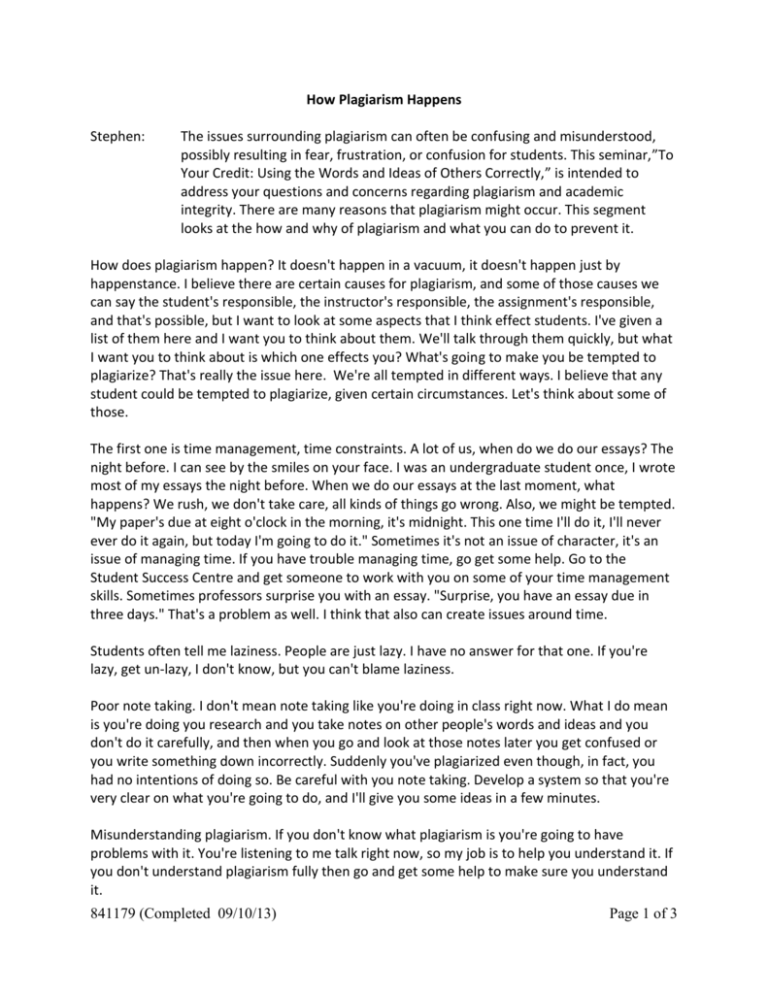
How Plagiarism Happens Stephen: The issues surrounding plagiarism can often be confusing and misunderstood, possibly resulting in fear, frustration, or confusion for students. This seminar,”To Your Credit: Using the Words and Ideas of Others Correctly,” is intended to address your questions and concerns regarding plagiarism and academic integrity. There are many reasons that plagiarism might occur. This segment looks at the how and why of plagiarism and what you can do to prevent it. How does plagiarism happen? It doesn't happen in a vacuum, it doesn't happen just by happenstance. I believe there are certain causes for plagiarism, and some of those causes we can say the student's responsible, the instructor's responsible, the assignment's responsible, and that's possible, but I want to look at some aspects that I think effect students. I've given a list of them here and I want you to think about them. We'll talk through them quickly, but what I want you to think about is which one effects you? What's going to make you be tempted to plagiarize? That's really the issue here. We're all tempted in different ways. I believe that any student could be tempted to plagiarize, given certain circumstances. Let's think about some of those. The first one is time management, time constraints. A lot of us, when do we do our essays? The night before. I can see by the smiles on your face. I was an undergraduate student once, I wrote most of my essays the night before. When we do our essays at the last moment, what happens? We rush, we don't take care, all kinds of things go wrong. Also, we might be tempted. "My paper's due at eight o'clock in the morning, it's midnight. This one time I'll do it, I'll never ever do it again, but today I'm going to do it." Sometimes it's not an issue of character, it's an issue of managing time. If you have trouble managing time, go get some help. Go to the Student Success Centre and get someone to work with you on some of your time management skills. Sometimes professors surprise you with an essay. "Surprise, you have an essay due in three days." That's a problem as well. I think that also can create issues around time. Students often tell me laziness. People are just lazy. I have no answer for that one. If you're lazy, get un-lazy, I don't know, but you can't blame laziness. Poor note taking. I don't mean note taking like you're doing in class right now. What I do mean is you're doing you research and you take notes on other people's words and ideas and you don't do it carefully, and then when you go and look at those notes later you get confused or you write something down incorrectly. Suddenly you've plagiarized even though, in fact, you had no intentions of doing so. Be careful with you note taking. Develop a system so that you're very clear on what you're going to do, and I'll give you some ideas in a few minutes. Misunderstanding plagiarism. If you don't know what plagiarism is you're going to have problems with it. You're listening to me talk right now, so my job is to help you understand it. If you don't understand plagiarism fully then go and get some help to make sure you understand it. 841179 (Completed 09/10/13) Page 1 of 3 Weak referencing skills, or weak citing skills. Sometimes people don't know: are they using APA, MLA, Chicago, Turabian, Vancouver, McGill? There's so many of them they cause confusion for students. You need to know what are the rules for APA. What are the rules for MLA? How are they different? What does my professor expect? So that you take away any chance of being misunderstood or confused. Weak paraphrasing and summarizing skills. Many of us have weak paraphrasing skills because paraphrasing is actually a very, very difficult skill to master, even for instructors it can be difficult. If we have these weaknesses we need to do something about it. The assignment. If the assignment isn't really clear and you don't really know what your professor's asking of you it's going to be very difficult for you to give it to him or her. If you're unsure what the topic is, if you’re unsure what are you supposed to do? Am I supposed to use sources? Am I not supposed to use sources? What actually is my professor expecting of me? Get clarity from the instructor, talk to your classmates; make sure you understand your assignment. Competitiveness. University is competitive, that's the nature of it. Some students go, "You know what? I have to cheat to compete." The result will be you might get through now, but ultimately it's going to hurt you and it's going to effect the environment you're in right now. If university is competitive, and it is, do something about it. Strengthen those skills. The last one I've written here is weak writing skills. If you have weak writing skills, if you're an international student, particularly, sometimes you feel like, "I can't really compete with native speakers when it comes to writing, so I'm going to copy a little bit just so I sound better." Much more important to work on those writing skills and develop your own voice and your own style. What can we do about this? We've talked about some of the issues why plagiarism might happen, and there could be many other reasons. The thing I want you to think about, though, is there's possible causes, and there's possible personal causes, so you need to know what cause might affect me, and then do something about it. For example, if you're finding you're always writing your essays at the last moment, go work on time management. Get that sorted out so that doesn't become one of the causes for you plagiarizing. If it's weak writing, go work on your writing skills, go get some help, take a course, talk to your instructor. I want to give you three other ideas to protect yourself from plagiarizing in general. Cite everything. When you're working on your notes put a reference down for everything. Data, information, anything like that, write it down. Anything that's not common knowledge, you need to let us know where you got it from. You can go back later and take some of those references out, take some of those citations out if you really want to, but originally when you're doing your draft, cite everything; you'll never go wrong. Secondly, use quotation marks. When you're transferring, cut, copy, paste from someone else's source put quotation marks around it. The problem with computers is that when you move it around there's no quotation marks. Make sure you copy it into your text, put quotation marks around it, and cite it. Let me give you one other idea that I have found useful over the years. Use colours. It's a very, very simple skill. Here's what I do. If I'm copying something from another source, I cut, copy, and past it, put it in my paper, put quotation marks around it, and I put it in a colour, let's say green. Why do I do that? What if, as I'm working on my paper some more, I take just the middle part of that quotation out and I move it to another part of my paper? When I do that what doesn't go with the quotation are the quotation marks. I start moving stuff around and it gets mixed up. But if mine is green, for example, every time I move it, it's green. Every time I see green what do I know? These are not my words. That's one thing. The other thing I do with colours is if I paraphrase someone's words and ideas, I will put it in a different colour, let's say red. Every time I put their paraphrased words I'll put it in red. They're my words but I've paraphrased them, so I have to know that these aren't my ideas. When I look at my paper I've got red and green and I know that the green is quoted material and the red is paraphrased. I make sure that I've got the appropriate citation. This is a very effective technique. Of course, when you hand the paper in get rid of the red and green, don't keep it there, but keep a draft of it. The final suggestion I have for you is this: use attributive tags. Sometimes people call them authorial tags, or whatnot. It would be something like this: "According to Dr. Smith ...", "Dr. Jones states ..." This is called a tag. If I use tags in my writing, no one's going to mistake if these are my ideas because I've said, "According to Dr. Jones ... Dr. Smith states ..." If you follow those three very simple rules, cite everything, use quotation marks when you're using someone else's words, and use attributive tags, you do those three simple things and they're going to protect you to a very large degree from issues related to plagiarizing unintentionally. 841179 (Completed 09/10/13) Page 3 of 3
